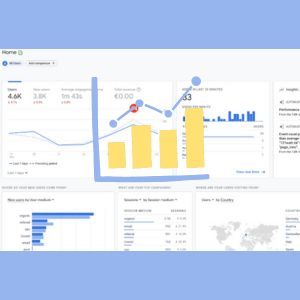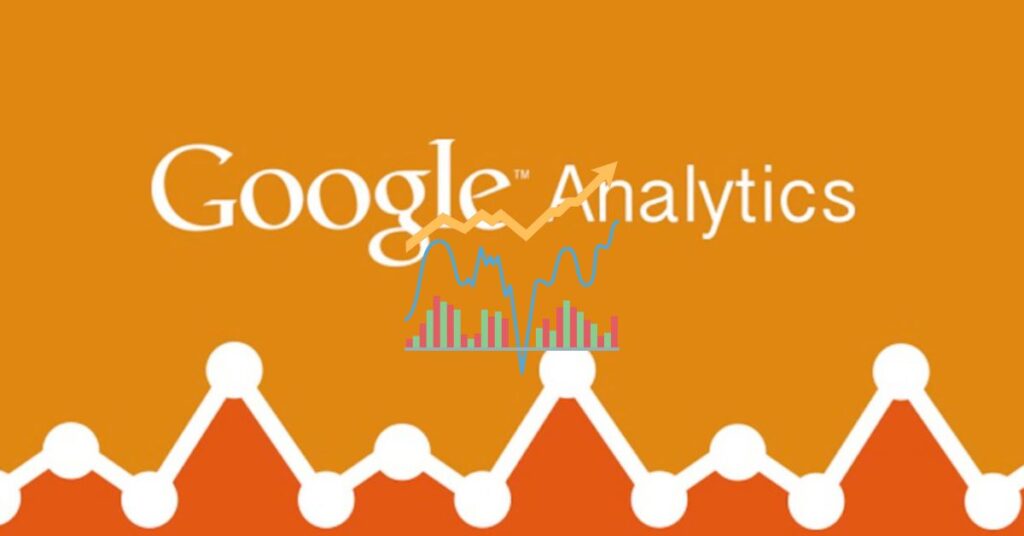Google Analytics is a powerful digital analytics tool that offers valuable insights on the performance of websites and apps. Analytics provides a wide range of data types for those who run personal blogs or online stores, helping them make informed decisions and enhance their online presence.
Google Analytics and its Purpose
Google Analytics is owned by Google. Clients have the ability to track website visitors and gather important information to understand user involvement. Recognizing user patterns, preferences, and actions is crucial in order to create digital strategies and enhance website performance.
Key Features of Google Analytics

An analysis of the origins of traffic
It provides information about the origins of the traffic to your website. Examples include referral links, sponsored content, paid search, and social media.
Assessment of the Content’s Effectiveness
The technology offers data on how users behave in order to better customize material for the intended audience. This includes the sites users browse, their location, and the duration of their visits.
Conversion Monitoring
Examples of conversions consist of actions such as buying products and completing online forms. Businesses can increase the number of desired activities in their conversion funnels.
Online shops can gain important information by examining customer journeys and cart abandonment rates. Tracking the enhancement of the overall shopping experience is the outcome of product performance.
Improvement of Content Strategy
Content creators have the ability to enhance their strategies and content. In order to grasp the preferences of their audience, they analyze the content types that receive the highest traffic and engagement.
Improving the overall user experience
By offering insights into user behaviour, the technology assists organizations in identifying user issues and improving website usability.
What is Google Analytics? Why is it Important?

Multiple functional components can be monitored and assessed by website owners, marketers, and analysts. Analyzing user behaviour on websites is possible by using Google Analytics, which allows tracking of user interactions. What actions they engage in and their interaction with the webpage.
Important Google Analytics Features
Study of traffic patterns
Google Analytics monitors the different sources of traffic that visit your website. Examples include Social networking, direct traffic, backlinks from other websites, and organic search.
Behaviour of user
It monitors user activity on your website, such as bounce rates, time spent on specific pages, and visited pages. Due to its conversion rates, indicating the proportion of visitors who successfully finish a certain task.
Information on the audience
It provides information on the demography and geography characteristics of your website visitors. Consequently, you may gain a deeper understanding of your target audience.
Objective assessment
Customized goals can be made in Google Analytics for tasks such as completing a purchase, filling out a contact form, or reaching a specific page. This program monitored the individuals performing these activities and provided information on the effectiveness of your website in meeting its goals.
Monitoring online shopping activity
Online retailers have the capability to collect and analyze e-commerce data about sales, revenue, and purchasing patterns.
Attribution of conversion
You can recognise the marketing initiatives through Google Analytics’ conversion attribution feature. Their primary duty is to generate conversions through various channels like ads, promos, and social media posts.
Specific Reports
Pay attention to the key performance indicators of your company. Tailored reports and dashboards can be created according to your requirements.
Examining apps for smartphones
Because it was previously utilized to measure user engagement in mobile apps. In addition to observing online user activity.
Applications of Google Analytics

The increase in internet sales
E-commerce platforms have the option to use Google Analytics as a tool to enhance the overall shopping experience. To track user route statistics, basket abandonment rates, and product performance.
Adjust your approach to content planning
Content creators can enhance their workflow to deliver more of the content their audience desires. Examine the most popular and highly-liked content categories.
The attainment of marketing objectives
Tracking the number of visitors and conversions generated by each campaign can be used to evaluate the effectiveness of marketing campaigns.
Enhancing the user experience
The discovery offers information on customer behaviour, aiding companies in pinpointing issues and improving website functionality.
Setting Up Google Analytics
Creating an Account
As soon as you’ve set up a Google Analytics account and linked your website to it. This adds a tracking code to your website’s HTML at first.
Setting Objectives
Clear goals, such lead generation, sales, or content engagement, should be the focus of your website.Make goals in Google Analytics to monitor these activities.
Navigating the Google Analytics Dashboard

Summary of Dashboard Categories
The dashboard offers a comprehensive overview of your website’s performance with up-to-date information on visitor numbers, sessions, bounce rates, and other metrics.
Privacy and Data Security Protection of User Data
Google Analytics places a high importance on data privacy and provides users with tools to assist them in following regulations such as the GDPR.
Utilizing IP addresses that cannot be identified
Website owners can choose to hide the identity of IP addresses.
How does Google Analytics determine the origin of visitors?
Utilises a tracking system that relies on cookies and URL parameters to identify the origin of the traffic. This code monitors user actions as they navigate a website without their knowledge and gathers data on their interactions with it. This is the method.
UTM Parameters
If a website that links to yours has particular UTM (Urchin Tracking Module) configurations. Google Analytics will collect these parameters from the URL. These guidelines are commonly utilized in advertising campaigns and posts on social media. UTM parameters can be added to URLs to give details about the source, media, campaign, and other link-related elements.
For example, Google Analytics can show where the traffic originates from a specific social media platform and the related campaign by using UTM parameters when posting a link on social media.
Referral Information
If someone clicks on a link in a blog post and ends up on your website, you can recognise the original website as the referral source.
Direct Traffics
Whenever a visitor goes to your website by typing the URL into their browser or using a bookmark, Google Analytics categorizes it as “direct” traffic. This frequently indicates that the visitor had prior knowledge of the website’s address and reached it directly without clicking on any links from external sites.
Organic Search
If a person searches for your website and then clicks on the search results, the search engine could be identified as the origin of the visitors.
Campaign Monitoring
If you have marketing campaigns and campaign monitoring enabled in Google Analytics, the tool can link visits to specific campaigns. Therefore, the campaign URLs are consistently updated with new tracking setups.
Social Media
Google Analytics is capable of pinpointing the specific social media platform that a visitor came from. When one person posts links to your content on social media platforms, others may click on those links.
Summary
Ultimately, Google Analytics provides valuable information to website owners and marketers regarding their online performance. Businesses have the opportunity to make smart choices in order to enhance user experience. For marketing plans to be successful, they must be optimized with an understanding of user behavior and performance data.
It is an effective instrument for assessing the success of online initiatives and for implementing changes to improve results. Google Analytics uses various tracking tags to gather data on how users discover your website. Cookies and URL parameters have the ability to pinpoint the sources of traffic to your website.

